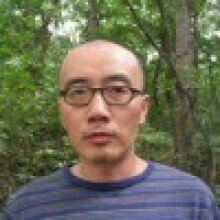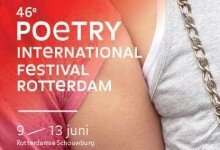
Han Dong was born on 17 May 1961 in Nanjing. At the height of the Cultural Revolution, at the age of eight, he was sent to the countryside in northern Jiangsu province with his parents. After graduating from the philosophy department of Shandong University in 1982, he taught Marxism-Leninism at various universities and colleges in Xi'an and Nanjing. He resigned from teaching in 1992 to concentrate on writing. In 1994, he worked at the Youth Literature Academy [Qingnian wenxue yuan] in Guangdong province. In 1996, he joined the Nike Arts company as a contracted writer. In 1995, he was awarded the Liu Li'an Poetry Prize. In 1998, he developed a form of literary activism called duanlie (fracture) with Zhu Wen and others.
For much of his writing career, Han Dong has been involved with various unofficial literary magazines. In 1982, he edited his own small journal Laojia (Hometown). In 1985, he helped set up the influential journal Tamen (They/Them), acting as its chief editor and its linghun renwu (heart and soul) in close collaboration with writers such as Ding Dang, Yu Jian, Xiaojun, Su Tong, Naigu and Xiaohai. Nine issues were produced between 1985-1988 and 1993-1995. In 2002, Tamen was relaunched as a webzine at www.tamen.net with Han Dong’s continued involvement. In recent years, he has devoted much of his energies to fiction, writing two novels as well as several short-story collections.
In an interview done in 1989, Han Dong declared that he wrote poetry for nobody, not even himself. He went on to liken the poet’s task to that of a roof-tiler: “I write poetry for the constitution of poetry, just as a roof-tiler gives no thought to who lives in the house whose roof he is covering — he builds to meet the criteria of what a house is. Poetry is not subordinate to purposes beyond itself: its highest purpose is to be without purpose.” Here, quite plainly, he refuses to associate his work with ‘noble’ ulterior motives. Possessing a knack for controversy, Han first caused a stir in Chinese poetry circles with his 1982 poem ‘Concerning the Wild Goose Pagoda’. The subject of the poem is a site with great significance for the Chinese since it was here that the intrepid monk Xuanzang (later immortalized — and shamelessly satirized — in the Monkey stories) worked on his translations of the Buddhist sutras he brought back from India.
In Han Dong's version, all high cultural associations are rejected in favour of an approach which, in the words of the critic and translator Li Fukang, sets out to deflate heroism and to ruthlessly dilute all traces of emotional intensity:
concerning the Wild Goose pagoda
what can we know
many hurry here from afar
climbing it
to play the hero once
still others come to play the hero twice
or more times
the disillusioned
the overweight
all climb up
to play the hero
then come down
go out into the street and disappear.
Although this poem can be read as a cynical attack on poetic high-mindedness, Han’s refusal to “play the hero” can be more productively interpreted in terms of his desire not to impose ulterior motives on his writing and to preserve what he calls poetry’s ‘innocence’. As another critic of his writing, Tao Naikan, has stated, Han is keen to avoid collective consciousness, historical viewpoints and assumed social responsibilities. Instead, poetry for him is grounded in a less aspirational, more immediately down-to-earth environment, but not as private, lyrical expression (lyricism is both too subjective and too emotive for his tastes). Rather, Han sees poetry as a curious blend of individual reality and impersonal objectivity.
In this selection of poems for Poetry International Web, Han has chosen material written between 2002 and 2005. A recurrent feature of his poetry is an interest in mind and the way mind relates to the world. In ‘Rain’, he is struck by the mind’s capacity for distraction: ordinary, noteworthy happenings such as rain tend to be overlooked when “some event is happening”. Another poem, ‘Scenario’, lightly engages with the mind’s ability to predict future events on the basis of past experience, a kind of living in advance of what has not yet taken place.
In his sombre poem on the winter solstice, he observes how the commemoration of the dead on this day by means of burning paper money creates a specific atmosphere of otherworldliness that allows people to believe in a kind of afterlife. Darkness is a theme he pursues through a number of different variations. ‘Round Jade’ should be read in conjunction with his fifth maxim (see “Ten Maxims or Utterances Concerning Poetry”): “A good poem in the real sense of the word is an enduring thing: it shines in the dark without in the least diminishing itself.”
In ‘Neon Sign’, the mood is sardonic, since the light of the sign in the dark of the night provides no genuine illumination, either physical or psychological. Darkness is also present in ‘Life’, where the randomness of what happens to us and our inevitable, eventual dying compose another form of obscurity in contrast to the fugitive beauty of a butterfly. One further clue to an understanding of Han’s poetic universe is provided in the second text of the brief suite entitled ‘What I Said to Myself’. In this short poem, the Chinese nizhuan (“a turn for the worse”) appears to be taken literally by the poet as a “contrary turn”. Rather than entrench the hold of the ego, that interior world with its innumerable emotions, thoughts, desires and fantasies, Han asks us to try an experiment in living in which we turn our full attention to the “real outside” while restoring our minds to valley-like openness. It seems a shocking notion from a poet who comes across as being a million light years away from mysticism.
Bibliography
Poetry
Baise de shitou (The white stone), Shanghai wenyi chubanshe, 1992
Baba zai tianshang kan wo (Daddy's watching me in heaven), Hebei jiaoyu chubanshe, 2002
Short stories
Xitianshang (In the western sky), Zuojia chubanshe, 1995
Women de shenti (Our bodies), Huaqiao chubanshe, 1995
Wode Bolatu (My Plato), Shaanxi shifan daxue chubanshe, 2000
Xiafang di (Sent to the country), Guangxi shifan daxue chubanshe, 2004
Mingliang de bahen (Shiny scar), Huayi chubanshe, 2005
Poetry and short stories
Jiaocha paodong (Running criss-cross), Dunhuang wenyi chubanshe, 2002
Novellas
Zhang'ai (Obstruction), Guangxi shifan daxue chubanshe, 2004
Novels
Zhagen (Setting down roots), Renmin wenxue chubanshe, 2003
Wo he ni (Me and you), Shanghai wenyi chubanshe, 2005
Ideas
Aiqing lixue (Love mechanics), 2005
Links
http://www.tamen.net
/>Tamen webzine
http://www.fascicle.com/issue02/chinese/handong1.htm
/>Translations of the poems ‘Noise’ and ‘Family History’ by Donald Revell and Zhang Er
www.isp.msu.edu/studiesonasia/s3_v2_n1/
Desecrations: The Poetics of Han Dong and Yu Jian by Maghiel van Crevel







